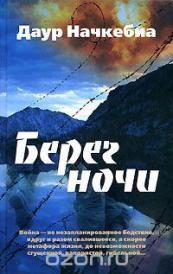The Abkhaz writer’s Russian-language novel The Shore of Night is about the Georgian-Abkhaz conflict. The novel has two main heroes. One of them, Adgur A., if we explain the metaphor, is in the night, in war; the other, Adgur’s old friend Beslan B. is on the shore, living in a post-war period and looking from there at the darkness of war. Beslan is helped by Adgur’s diaries, which have by chance come into his hands. These two lines — Beslan in the post-war period and Adgur in the war — continue throughout the novel. Each line has its own particular voice, because Adgur is a writer, while Beslan is a physicist: the familiar dilemma of being either a physicist or a lyrical poet is made even more acute by that of war and peace. The novel’s main question or task lies in Adgur’s unsatisfactory, impulsive actions: during a battle, he suddenly climbs a hill, takes his helmet off and fires into the air and points the gun at a sniper’s head in order to shoot him. His existential state emerges gradually in the diary, his stream of consciousness is that of a man at a time of war or peace, ready for sacrifice, for a change, or an absence of change, in the essence of life DaurNachkebia creates an interesting gallery of characters around Beslan. Apart from bringing out his nature, these characters give an insight into the ‘Sukhumi man’ phenomenon in all its mental colourfulness. The novel ends with a few short stories found in Adgur’s exercise book. The novel’s main theme, man in war, seeks to become parabolic, something on which the text plays, while on the other hand it explains and tries to shed more light.
‘Clearly Nachkebia's ways of writing a novel are in The Shore of Night closes to modern European writers, rather than Russian ones, even closer to Latin-American prose that is usually classified as ‘magical realism’. Moreover, one can say without hesitation that this is an essay-novel which makes one recall not just certain works by Thomas Mann, but recent novels by Milan Kundera, written in French.’
Zharko Milenić, (from the foreword to the Serb translation of the novel)
‘Daur Nachkebia has set himself the most complex creative task: to work out who in this world is actually alive, and who is dead. Without any mysticism. Actually, aren’t our deeds often similar to tricks played by the dead?..In the sense that many of our actions have not a drop of sense or conscience underlying them. As if everything has died off.’
Aleksandr Iakovlev, critic
Extract will be available soon
In case of using the information, please, indicate the source.
